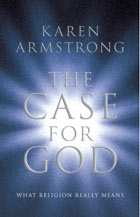This is a nice addition to the debates about religion - she advocates for religion as a practice, not as a set of beliefs. She presents the argument that all religions were, at their best, about practice and not about an intellectual set of beliefs. I like that idea - might need to read this book.
All quiet on the God front
Simon Blackburn discusses the argument that religious experience can't be discussed
- The Guardian, Saturday 4 July 2009
- Article history
This is an eloquent and interesting book, although you do not quite get what it says on the tin. Karen Armstrong takes the reader through a history of religious practice in many different cultures, arguing that in the good old days and purest forms they all come to much the same thing. They use devices of ritual, mystery, drama, dance and meditation in order to enable us better to cope with the vale of tears in which we find ourselves. Religion is therefore properly a matter of a practice, and may be compared with art or music. These are similarly difficult to create, and even to appreciate. But nobody who has managed either would doubt that something valuable has happened in the process. We come out of the art gallery or concert hall enriched and braced, elevated and tranquil, and may even fancy ourselves better people, though the change may or may not be noticed by those around us.
The Case for God: What Religion Really Means
by Karen Armstrong 384pp, Bodley Head, £20
Buy The Case for God at the Guardian bookshopThis is religion as it should be, and, according to Armstrong, as it once was in all the world's best traditions. However, there is a serpent in this paradise, as in others. Or rather, several serpents, but the worst is the folly of intellectualising the practice. This makes it into a matter of belief, argument, and ultimately dogma. It debases religion into a matter of belief in a certain number of propositions, so that if you can recite those sincerely you are an adept, and if you can't you fail. This is Armstrong's principal target. With the scientific triumphs of the 17th century, religion stopped being a practice and started to become a theory - in particular the theory of the divine architect. This is a perversion of anything valuable in religious practice, Armstrong writes, and it is only this perverted view that arouses the scorn of modern "militant" atheists. So Dawkins, Dennett, Hitchens and Harris have chosen a straw man as a target. Real religion is serenely immune to their discovery that it is silly to talk of a divine architect.
So what should the religious adept actually say by way of expressing his or her faith? Nothing. This is the "apophatic" tradition, in which nothing about God can be put into words. Armstrong firmly recommends silence, having written at least 15 books on the topic. Words such as "God" have to be seen as symbols, not names, but any word falls short of describing what it symbolises, and will always be inadequate, contradictory, metaphorical or allegorical. The mystery at the heart of religious practice is ineffable, unapproachable by reason and by language. Silence is its truest expression. The right kind of silence, of course, not that of the pothead or inebriate. The religious state is exactly that of Alice after hearing the nonsense poem "Jabberwocky": "Somehow it seems to fill my head with ideas - only I don't exactly know what they are." If Alice puts on a dog collar, she will be at one with the tradition.
Armstrong is not presenting a case for God in the sense most people in our idolatrous world would think of it. The ordinary man or woman in the pew or on the prayer mat probably thinks of God as a kind of large version of themselves with mysterious powers and a rather nasty temper. That is the vice of theory again, and as long as they think like that, ordinary folk are not truly religious, whatever they profess. By contrast, Armstrong promises that her kinds of practice will make us better, wiser, more forgiving, loving, courageous, selfless, hopeful and just. Who can be against that?
The odd thing is that the book presupposes that such desirable improvements are the same thing as an increase in understanding - only a kind of understanding that has no describable content. It is beyond words, yet is nevertheless to be described in terms of awareness and truth. But why should we accept that? Imagine that I come out of the art gallery or other trance with a beatific smile on my face. I have enjoyed myself, and feel better. Perhaps I give a coin to the beggar I ignored on the way in. Even if I do so, there is no reason to describe the improvement in terms of my having understood anything. If I feel more generous, well and good, but the proof of that pudding is not my beatific smile but how I behave. As Wittgenstein, whose views on religion Armstrong thoroughly endorses, also said, an inner process stands in need of outward criteria. You can feel good without being good, and be good without stretching your understanding beyond words. Her experience of "Jabberwocky" may have improved Alice.
Silence is just that. It is a kind of lowest common denominator of the human mind. The machine is idling. Which direction it then goes after a period of idling is a highly unpredictable matter. As David Hume put it, in human nature there is "some particle of the dove, mixed in with the wolf and the serpent". So we can expect that some directions will be better and others worse. And that is what, alas, we always find, with or without the song and dance.
• Simon Blackburn's Truth: A Guide for the Perplexed is published by Penguin.

No comments:
Post a Comment